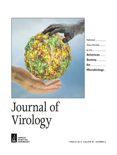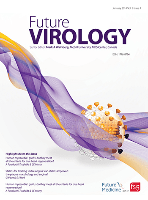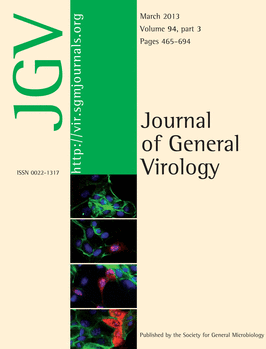
VIRUS GENES
Scope & Guideline
Exploring the Genetic Blueprint of Viruses
Introduction
Aims and Scopes
- Molecular Characterization of Viruses:
Research articles often focus on the molecular characterization of various viruses, including their genome sequencing, phylogenetic analysis, and identification of novel viral strains. This includes studies on both animal and plant viruses. - Viral Pathogenesis and Host Interactions:
The journal publishes studies examining the mechanisms of viral pathogenesis, including how viruses interact with host cellular processes and immune responses. This area includes research on viral proteins and their roles in disease. - Viral Therapeutics and Vaccines:
There is a significant emphasis on the development of antiviral therapies and vaccines, particularly in response to emerging viral threats. Research often explores novel treatment strategies, such as CRISPR technology and vaccine escape variants. - Phage and Bacteriophage Research:
VIRUS GENES includes studies on bacteriophages, their characterization, and their potential applications in combating antibiotic-resistant bacteria, reflecting an interest in phage therapy. - Virome Analysis and Environmental Virology:
The journal covers virome analysis studies that investigate the viral diversity in different environments, which enhances the understanding of viral ecology and evolution.
Trending and Emerging
- CRISPR and Genome Editing Applications:
There is a growing trend in utilizing CRISPR technology for viral research, particularly in developing antiviral strategies and understanding viral genome functions. This reflects the increased interest in gene editing as a tool for combating viral infections. - In Silico and Computational Approaches:
Emerging themes include the use of bioinformatics and computational modeling to study viral genomes and predict viral behavior, which is becoming a crucial aspect of virology research. - Viral Evolution and Epidemiology:
Recent publications reflect an increased focus on studies of viral evolution, particularly in response to outbreaks and the emergence of new strains, highlighting the importance of understanding viral dynamics in public health. - Viral Interference in Cancer Biology:
Research linking viral infections to cancer development and progression is on the rise, particularly studies exploring how viral proteins manipulate host cellular pathways. - Multi-Omics Approaches in Virology:
An emerging trend is the application of multi-omics approaches (genomics, transcriptomics, proteomics) to gain a holistic understanding of viral interactions with hosts, indicating a shift towards integrative research methodologies.
Declining or Waning
- Traditional Virus Classification:
There seems to be a decline in studies solely focused on traditional virus classification methods, as the field increasingly shifts towards more advanced genomic and phylogenetic approaches. - Basic Viral Biology Studies:
Research purely focused on basic viral biology without clear applications or implications for health or disease management is appearing less frequently, indicating a potential shift towards more translational research. - Non-Viral Pathogen Interactions:
Studies exploring interactions with non-viral pathogens (e.g., bacteria, fungi) are becoming less common, as the journal's focus narrows more specifically to viral research.
Similar Journals

ARCHIVES OF VIROLOGY
Advancing knowledge in viral research.Archives of Virology is a prestigious academic journal dedicated to the field of virology, published by Springer Wien. Established in 1975, this journal has been a crucial platform for disseminating innovative research findings and advancements in the understanding of viral diseases and their impact on human health. It holds a notable position in the academic landscape, with a 2023 impact factor placing it in Q2 within the field of Medicine (miscellaneous) and Q3 in Virology. Its Scopus ranking within the Virology category further underscores its relevance, with a notable percentile of 45th. Although it does not provide Open Access options, the journal's rigorous peer-review process ensures the highest quality of published work, making it an essential resource for researchers, professionals, and students aiming to stay updated in the rapidly evolving field of virology. For those committed to advancing their understanding of viruses and viral diseases, Archives of Virology is a vital scholarly resource.

Journal of Virus Eradication
Advancing the fight against viral threats.Welcome to the Journal of Virus Eradication, a premier publication dedicated to advancing the field of virology and infectious disease research. Published by MEDISCRIPT LTD, this journal provides a vital platform for sharing cutting-edge research findings in key areas including epidemiology, immunology, and public health. With an impressive classification of Q2 in Epidemiology and Infectious Diseases for 2023, this journal exemplifies a commitment to high-quality scholarship and impactful research. The Journal of Virus Eradication is instrumental in disseminating knowledge that tackles viral threats, contributing to global health initiatives aimed at virus containment and eradication. Researchers, professionals, and students alike will find this journal an invaluable resource, making significant contributions to the scientific community and society at large.

VIROLOGIE
Fostering knowledge in the evolving world of virology.VIROLOGIE is a prominent international journal dedicated to advancing the field of virology and infectious diseases, published by John Libbey Eurotext Ltd. Since its inception in 1997, this journal has provided a platform for researchers and professionals to disseminate their findings on various aspects of virology, including the pathogenesis, epidemiology, and treatment of viral infections. Despite its current ranking in Q4 for both Infectious Diseases and Virology categories, the journal remains a valuable resource for emerging research and novel insights. The ISSN for the journal is 1267-8694, and it is based in France. VIROLOGIE is committed to upholding rigorous academic standards and fosters an inclusive scholarly community, making it an essential read for those pursuing knowledge and advancements in the ever-evolving landscape of virology. While the journal does not currently offer open access options, it continues to contribute significantly to the global discourse on viral research through its diverse range of published studies.

Journal of Virology
Transforming Insights into Virology and HealthJournal of Virology is a premier scholarly journal dedicated to advancing the field of virology, focusing on the molecular mechanisms of virus-host interactions, viral pathogenesis, and the latest therapeutic and vaccine developments. Published by the American Society for Microbiology, this esteemed journal has been a cornerstone for researchers since its inception in 1967, providing a platform for high-quality, peer-reviewed research. With a commendable impact factor indicative of its relevance and influence, the journal is categorized in the top quartile (Q1) for Virology, Microbiology, and Insect Science, reflecting its significance in these fields. Researchers can access a wealth of studies and findings that shape our understanding of viruses and their interactions with hosts, highlighting its role in both basic and applied sciences. Positioned in the United States, the Journal of Virology serves a global audience, ensuring that cutting-edge discoveries reach professionals, students, and academics alike. Join the conversation as we explore the complexities of virology and its implications for human health and disease.

JOURNAL OF CLINICAL VIROLOGY
Leading the Charge in Virology Research and TreatmentJournal of Clinical Virology, published by Elsevier, stands at the forefront of virology research, focusing on the clinical implications of viral diseases. With an impressive impact factor representative of its Q1 categorization in both Infectious Diseases and Virology, this journal is essential for researchers and healthcare professionals aiming to keep pace with evolving knowledge and treatments in virology. Since its inception in 1998, it has provided a vital platform for the dissemination of significant breakthroughs, now continuing through to 2024. The journal boasts competitive Scopus ranks, placing it in the 95th percentile for Infectious Diseases and the 91st percentile for Virology. Scholars can benefit from its selective Open Access options, promoting widespread access to cutting-edge research. With an ever-increasing demand for innovative solutions to viral infections, Journal of Clinical Virology remains dedicated to fostering advancements in the field, making it a key resource for anyone invested in virology and infectious disease management.

ACTA VIROLOGICA
Connecting researchers to combat viral challenges.ACTA VIROLOGICA, a key journal in the field of virology and infectious diseases, is published by FRONTIERS MEDIA SA in Slovakia, serving the global scientific community with groundbreaking research since its inception in 1957. This esteemed journal, identified by ISSN 0001-723X and E-ISSN 1336-2305, provides a platform for rigorous peer-reviewed articles that contribute significantly to our understanding of viral pathogens and their implications in medicine. Positioned within the Q3 category for both Infectious Diseases and Miscellaneous Medicine, and a Q4 category for Virology in 2023, ACTA VIROLOGICA offers crucial insights into the evolving landscape of virology research. With its robust accessibility options, this journal appeals to a diverse readership, including researchers, healthcare professionals, and students, fostering a collaborative environment to advance the field of virology. The editorial objective is to enhance the catalog of knowledge pertaining to viruses, promoting innovative approaches in prevention, diagnostics, and treatment. Located at AVENUE DU TRIBUNAL FEDERAL 34, LAUSANNE CH-1015, SWITZERLAND, ACTA VIROLOGICA continues to be a vital resource in the collective efforts to combat viral disease challenges.

Tumour Virus Research
Empowering discoveries in virology and oncology.Tumour Virus Research, an esteemed journal published by Elsevier, serves as a vital resource in the fields of cancer research, infectious diseases, and virology. With an impact factor reflective of its influence and recognized as a Q2 journal in multiple categories as of 2023, it rigorously presents high-impact research dedicated to the understanding of viral pathogens in tumorigenesis. Since its transition to an Open Access model in 2021, the journal has enhanced accessibility, empowering researchers and the academic community globally to explore cutting-edge findings. The journal covers a broad scope, encompassing the intricate interactions between viruses and cancer biology, which is crucial for developing novel therapeutic strategies. With a commitment to advancing scientific knowledge, Tumour Virus Research welcomes submissions that push the boundaries of current understanding and contribute to the ongoing battle against virus-mediated cancers, making it an indispensable publication for professionals, researchers, and students in the field.

Molecular Genetics Microbiology and Virology
Unraveling the Mysteries of Infectious DiseasesMolecular Genetics Microbiology and Virology is an esteemed academic journal published by PLEIADES PUBLISHING INC, specializing in the complex interplay of genetics, microbiology, and virology. Established in 2007, this journal serves as a crucial platform for researchers and professionals committed to advancing our understanding of infectious diseases and molecular biology. Despite its current categorization in Q4 across several fields, the journal aims to evolve and foster significant discourse within the scientific community. While not an open access journal, it provides essential insights and high-quality research articles that contribute to the body of knowledge in molecular genetics and related disciplines. Located in the vibrant research landscape of New York, USA, the journal also encourages new submissions that address cutting-edge research topics and emerging trends in infectious diseases, thereby appealing to both emerging scholars and seasoned experts alike.

Future Virology
Unveiling the Future of Viral ScienceFuture Virology, published by Future Medicine Ltd, is an essential journal dedicated to advancing the understanding of virology in the contemporary scientific landscape. With an ISSN of 1746-0794 and an E-ISSN of 1746-0808, this journal serves as a platform for researchers and practitioners in the field to publish high-quality, peer-reviewed articles that explore novel discoveries, innovative therapeutic strategies, and the implications of viral research on global health. Operating from the United Kingdom and maintaining a commitment to rigorous scientific inquiry, Future Virology is categorized in the Q4 Quartile for Virology according to the latest Scopus rankings, with a position of Rank #48/80 and a percentile of 40th in the Virology category. Although it currently does not offer open access, the journal strives to disseminate critical insights that benefit a wide range of professionals, researchers, and students engaged in virology and related fields. By bridging the gap between basic research and practical applications, Future Virology plays a crucial role in fostering innovation and collaboration in the ever-evolving virology landscape.

JOURNAL OF GENERAL VIROLOGY
Exploring the forefront of virological science.The JOURNAL OF GENERAL VIROLOGY, published by the Microbiology Society, is a premier academic journal dedicated to advancing the field of virology. Established in 1967, this influential journal covers a wide spectrum of research from basic virology to applied studies, serving as a vital resource for researchers, professionals, and students alike. With its ISSN 0022-1317 and E-ISSN 1465-2099, the journal is recognized for its rigorous peer-review process and high-quality publications, attaining a commendable Q2 ranking in the Virology category for 2023. The journal's focus on disseminating innovative findings and fostering critical discussions contributes significantly to the understanding of viral mechanisms, disease processes, and potential therapeutic strategies. Although it does not currently offer Open Access options, the journal remains accessible to the academic community, with a strong commitment to supporting virology research globally. As part of Scopus' top-tier rankings, illustrating its impact within the category of Immunology and Microbiology, the JOURNAL OF GENERAL VIROLOGY continues to play a pivotal role in shaping the future of virological science.